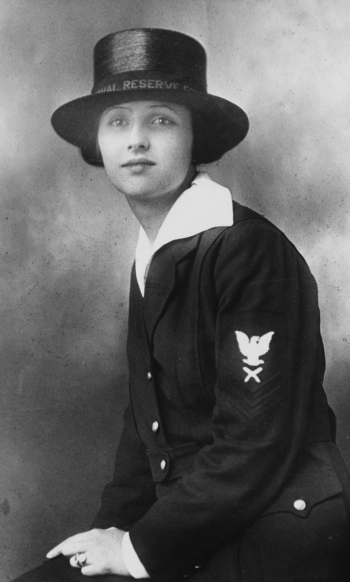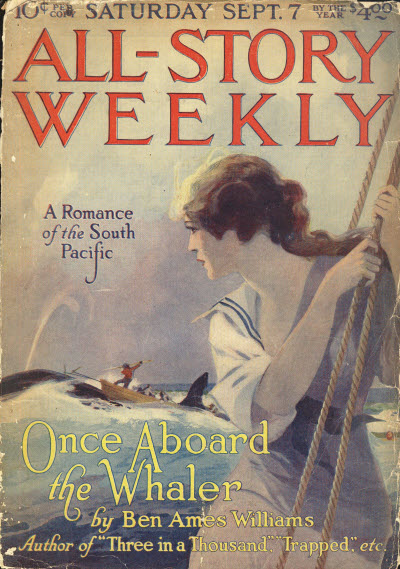FRIEND ISLAND (1)
By:
May 9, 2021

Using the masculine pen name “Francis Stevens,” from 1917–1923 Gertrude Barrows Bennett emerged as one of the first female writers to make a mark in fantasy writing and the nascent sf genre. HiLoBooks is pleased to serialize her 1918 story “Friend Island,” a proto-Forbidden Planet parable set in a woman-dominated 22nd century, for HILOBROW’s readers.
ALL INSTALLMENTS: 1 | 2 | 3 | 4 | 5.
It was upon the waterfront that I first met her, in one of the shabby little tea shops frequented by able sailoresses of the poorer type. The uptown, glittering resorts of the Lady Aviators’ Union were not for such as she.
Stern of feature, bronzed by wind and sun, her age could only be guessed, but I surmised at once that in her I beheld a survivor of the age of turbines and oil engines — a true sea-woman of that elder time when woman’s superiority to man had not been so long recognized. When, to emphasize their victory, women in all ranks were sterner than today’s need demands.
The spruce, smiling young maidens — engine-women and stokers of the great aluminum rollers, but despite their profession, very neat in gold-braided blue knickers and boleros — these looked askance at the hard-faced relic of a harsher day, as they passed in and out of the shop.
I, however, brazenly ignoring similar glances at myself, a mere male intruding on the haunts of the world’s ruling sex, drew a chair up beside the veteran. I ordered a full pot of tea, two cups and a plate of macaroons, and put on my most ingratiating air. Possibly my unconcealed admiration and interest were wiles not exercised in vain. Or the macaroons and tea, both excellent, may have loosened the old sea-woman’s tongue. At any rate, under cautious questioning, she had soon launched upon a series of reminiscences well beyond my hopes for color and variety.
“When I was a lass,” quoth the sea-woman, after a time, “there was none of this high-flying, gilt-edged, leather-stocking luxury about the sea. We sailed by the power of our oil and gasoline. If they failed on us, like as not ’twas the rubber ring and the rolling wave for ours.”
She referred to the archaic practice of placing a pneumatic affair called a life-preserver beneath the arms, in case of that dreaded disaster, now so unheard of, shipwreck.
“In them days there was still many a man bold enough to join our crews. And I’ve knowed cases,” she added condescendingly, “where just by the muscle and brawn of such men some poor sailor lass has reached shore alive that would have fed the sharks without ’em. Oh, I ain’t so down on men as you might think. It’s the spoiling of them that I don’t hold with. There’s too much preached nowadays that man is fit for nothing but to fetch and carry and do nurse-work in big child-homes. To my mind, a man who hasn’t the nerve of a woman ain’t fitted to father children, let alone raise ’em. But that’s not here nor there. My time’s past, and I know it, or I wouldn’t be setting here gossipin’ to you, my lad, over an empty teapot.”
I took the hint, and with our cups replenished, she bit thoughtfully into her fourteenth macaroon and continued.
“There’s one voyage I’m not likely to forget, though I live to be as old as Cap’n Mary Barnacle, of the Shouter. ’Twas aboard the old Shouter that this here voyage occurred, and it was her last and likewise Cap’n Mary’s. Cap’n Mary, she was then that decrepit, it seemed a mercy that she should go to her rest, and in good salt water at that.
“I remember the voyage for Cap’n Mary’s sake, but most I remember it because ’twas then that I come the nighest in my life to committin’ matrimony. For a man, the man had nerve; he was nearer bein’ companionable than any other man I ever seed; and if it hadn’t been for just one little event that showed up the — the mannishness of him, in a way I couldn’t abide, I reckon he’d be keepin’ house for me this minute.”
“We cleared from Frisco with a cargo of silkateen petticoats for Brisbane. Cap’n Mary was always strong on petticoats. Leather breeches or even half-skirts would ha’ paid far better, they being more in demand like, but Cap’n Mary was three-quarters owner, and says she, land women should buy petticoats, and if they didn’t it wouldn’t be the Lord’s fault nor hers for not providing ’em.
“We cleared on a fine day, which is an all sign — or was, then when the weather and the seas o’ God still counted in the trafficking of the humankind. Not two days out we met a whirling, mucking bouncer of a gale that well nigh threw the old Shouter a full point off her course in the first wallop. She was a stout craft, though. None of your featherweight, gas-lightened, paper-thin alloy shells, but toughened aluminum from stern to stern. Her turbine drove her through the combers at a forty-five knot clip, which named her a speedy craft for a freighter in them days.
“But this night, as we tore along through the creaming green billows, something unknown went ’way wrong down below.

RADIUM AGE PROTO-SF: “Radium Age” is Josh Glenn’s name for the nascent sf genre’s c. 1900–1935 era, a period which saw the discovery of radioactivity, i.e., the revelation that matter itself is constantly in movement — a fitting metaphor for the first decades of the 20th century, during which old scientific, religious, political, and social certainties were shattered. More info here.
SERIALIZED BY HILOBOOKS: James Parker’s Cocky the Fox | Annalee Newitz’s “The Great Oxygen Race” | Matthew Battles’s “Imago” | & many more original and reissued novels and stories.
ORIGINAL FICTION: HILOBROW has serialized three novels: James Parker’s The Ballad of Cocky The Fox (“a proof-of-concept that serialization can work on the Internet” — The Atlantic); Karinne Keithley Syers’s Linda Linda Linda (which includes original music); and Robert Waldron’s roman à clef The School on the Fens. We also publish original stories and comics. These include: Matthew Battles’s stories “Gita Nova“, “Makes the Man,” “Imago,” “Camera Lucida,” “A Simple Message”, “Children of the Volcano”, “The Gnomon”, “Billable Memories”, “For Provisional Description of Superficial Features”, “The Dogs in the Trees”, “The Sovereignties of Invention”, and “Survivor: The Island of Dr. Moreau”; several of these later appeared in the collection The Sovereignties of Invention | Peggy Nelson’s “Mood Indigo“, “Top Kill Fail“, and “Mercerism” | Annalee Newitz’s “The Great Oxygen Race” | Flourish Klink’s Star Trek fanfic “Conference Comms” | Charlie Mitchell’s “A Fantasy Land” | Charlie Mitchell’s “Sentinels” | Joshua Glenn’s “The Lawless One”, and the mashup story “Zarathustra vs. Swamp Thing” | Adam McGovern and Paolo Leandri’s Idoru Jones comics | John Holbo’s “Sugarplum Squeampunk” | “Another Corporate Death” (1) and “Another Corporate Death” (2) by Mike Fleisch | Kathryn Kuitenbrouwer and Frank Fiorentino’s graphic novel “The Song of Otto” (excerpt) | John Holbo’s graphic novel On Beyond Zarathustra (excerpt) | “Manoj” and “Josh” by Vijay Balakrishnan | “Verge” by Chris Rossi, and his audio novel Low Priority Hero | EPIC WINS: THE ILIAD (1.408-415) by Flourish Klink | EPIC WINS: THE KALEVALA (3.1-278) by James Parker | EPIC WINS: THE ARGONAUTICA (2.815-834) by Joshua Glenn | EPIC WINS: THE MYTH OF THE ELK by Matthew Battles | TROUBLED SUPERHUMAN CONTEST: Charles Pappas, “The Law” | CATASTROPHE CONTEST: Timothy Raymond, “Hem and the Flood” | TELEPATHY CONTEST: Rachel Ellis Adams, “Fatima, Can You Hear Me?” | OIL SPILL CONTEST: A.E. Smith, “Sound Thinking | LITTLE NEMO CAPTION CONTEST: Joe Lyons, “Necronomicon” | SPOOKY-KOOKY CONTEST: Tucker Cummings, “Well Marbled” | INVENT-A-HERO CONTEST: TG Gibbon, “The Firefly” | FANFICTION CONTEST: Lyette Mercier’s “Sex and the Single Superhero”
